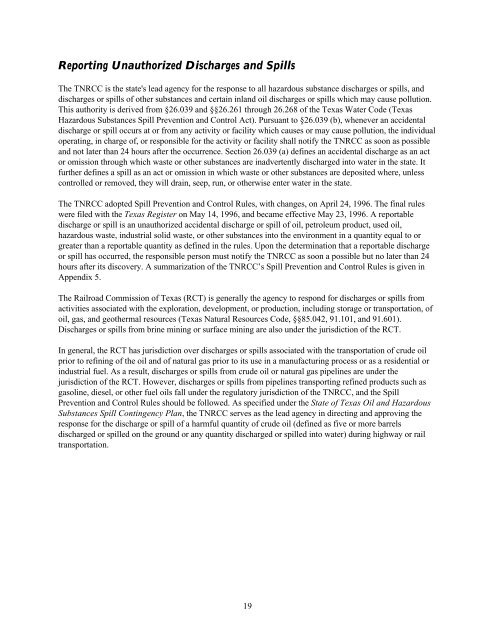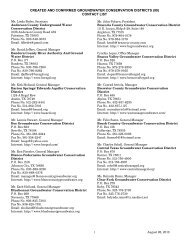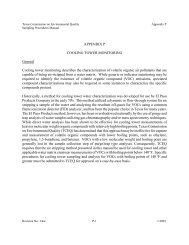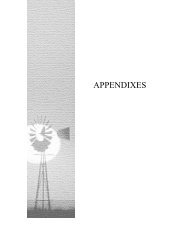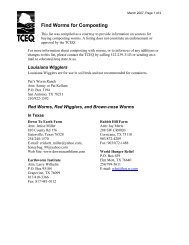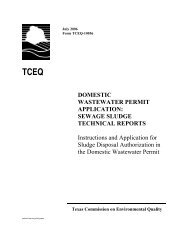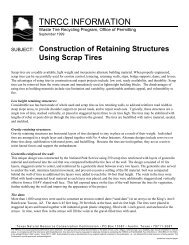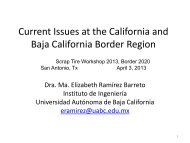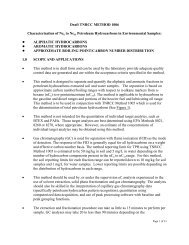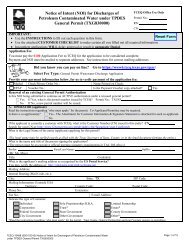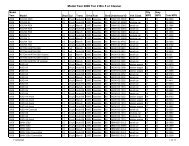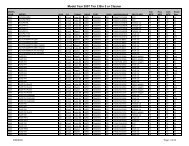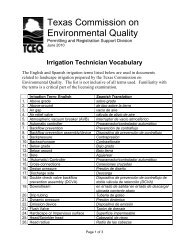joint groundwater report - Texas Commission on Environmental ...
joint groundwater report - Texas Commission on Environmental ...
joint groundwater report - Texas Commission on Environmental ...
Create successful ePaper yourself
Turn your PDF publications into a flip-book with our unique Google optimized e-Paper software.
Reporting Unauthorized Discharges and SpillsThe TNRCC is the state's lead agency for the resp<strong>on</strong>se to all hazardous substance discharges or spills, anddischarges or spills of other substances and certain inland oil discharges or spills which may cause polluti<strong>on</strong>.This authority is derived from §26.039 and §§26.261 through 26.268 of the <str<strong>on</strong>g>Texas</str<strong>on</strong>g> Water Code (<str<strong>on</strong>g>Texas</str<strong>on</strong>g>Hazardous Substances Spill Preventi<strong>on</strong> and C<strong>on</strong>trol Act). Pursuant to §26.039 (b), whenever an accidentaldischarge or spill occurs at or from any activity or facility which causes or may cause polluti<strong>on</strong>, the individualoperating, in charge of, or resp<strong>on</strong>sible for the activity or facility shall notify the TNRCC as so<strong>on</strong> as possibleand not later than 24 hours after the occurrence. Secti<strong>on</strong> 26.039 (a) defines an accidental discharge as an actor omissi<strong>on</strong> through which waste or other substances are inadvertently discharged into water in the state. Itfurther defines a spill as an act or omissi<strong>on</strong> in which waste or other substances are deposited where, unlessc<strong>on</strong>trolled or removed, they will drain, seep, run, or otherwise enter water in the state.The TNRCC adopted Spill Preventi<strong>on</strong> and C<strong>on</strong>trol Rules, with changes, <strong>on</strong> April 24, 1996. The final ruleswere filed with the <str<strong>on</strong>g>Texas</str<strong>on</strong>g> Register <strong>on</strong> May 14, 1996, and became effective May 23, 1996. A <str<strong>on</strong>g>report</str<strong>on</strong>g>abledischarge or spill is an unauthorized accidental discharge or spill of oil, petroleum product, used oil,hazardous waste, industrial solid waste, or other substances into the envir<strong>on</strong>ment in a quantity equal to orgreater than a <str<strong>on</strong>g>report</str<strong>on</strong>g>able quantity as defined in the rules. Up<strong>on</strong> the determinati<strong>on</strong> that a <str<strong>on</strong>g>report</str<strong>on</strong>g>able dischargeor spill has occurred, the resp<strong>on</strong>sible pers<strong>on</strong> must notify the TNRCC as so<strong>on</strong> a possible but no later than 24hours after its discovery. A summarizati<strong>on</strong> of the TNRCC’s Spill Preventi<strong>on</strong> and C<strong>on</strong>trol Rules is given inAppendix 5.The Railroad <str<strong>on</strong>g>Commissi<strong>on</strong></str<strong>on</strong>g> of <str<strong>on</strong>g>Texas</str<strong>on</strong>g> (RCT) is generally the agency to resp<strong>on</strong>d for discharges or spills fromactivities associated with the explorati<strong>on</strong>, development, or producti<strong>on</strong>, including storage or transportati<strong>on</strong>, ofoil, gas, and geothermal resources (<str<strong>on</strong>g>Texas</str<strong>on</strong>g> Natural Resources Code, §§85.042, 91.101, and 91.601).Discharges or spills from brine mining or surface mining are also under the jurisdicti<strong>on</strong> of the RCT.In general, the RCT has jurisdicti<strong>on</strong> over discharges or spills associated with the transportati<strong>on</strong> of crude oilprior to refining of the oil and of natural gas prior to its use in a manufacturing process or as a residential orindustrial fuel. As a result, discharges or spills from crude oil or natural gas pipelines are under thejurisdicti<strong>on</strong> of the RCT. However, discharges or spills from pipelines transporting refined products such asgasoline, diesel, or other fuel oils fall under the regulatory jurisdicti<strong>on</strong> of the TNRCC, and the SpillPreventi<strong>on</strong> and C<strong>on</strong>trol Rules should be followed. As specified under the State of <str<strong>on</strong>g>Texas</str<strong>on</strong>g> Oil and HazardousSubstances Spill C<strong>on</strong>tingency Plan, the TNRCC serves as the lead agency in directing and approving theresp<strong>on</strong>se for the discharge or spill of a harmful quantity of crude oil (defined as five or more barrelsdischarged or spilled <strong>on</strong> the ground or any quantity discharged or spilled into water) during highway or railtransportati<strong>on</strong>.19


